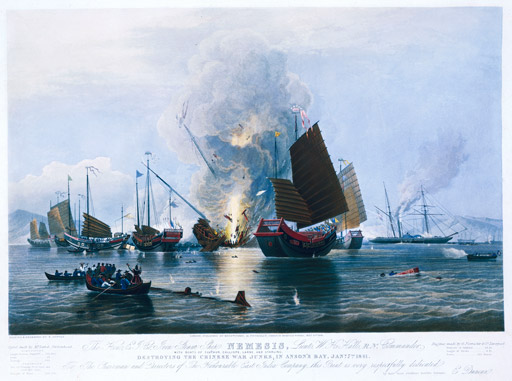4 The Anglo-Chinese War
Again, the First Anglo-Chinese War is a good window into what sort of system of power, in economic terms, that Britain was trying to build from early in the nineteenth century. The First Anglo-Chinese War arose out of economic questions. China had made opium imports illegal from 1796, but the East India Company circumvented this.

The East India Company auctioned off Bengal opium, whose production it monopolised, to private ‘country traders’ such as those of Jardine and Matheson. So successful were these, with the connivance of local Chinese officials, that by the 1820s Chinese consumption was soaring, and the influx of silver into China, to pay for European imports of porcelain, tea and silk, had now turned into an outflow. Alarmed at the moral and fiscal decline of his empire, in 1839 the emperor appointed Lin Zexu (Lin Tse-hsu) as the new commissioner of Guangzhou with orders to stop the trade. Lin had the British traders hand over 20,000 chests of opium, but, misunderstanding the British view on this property, destroyed these rather than negotiating their return or compensation. A cessation of Anglo-Chinese trade resulted, and naval incidents spiralled into war.
But the resulting war was more than simply an attempt to ensure the opium trade continued. It also represented an attempt to foist the new doctrine of ‘free trade’ on China. The EIC had founded Singapore as a free-trade port in 1819, and by the 1840s British duties on imports were being reduced en masse. Britain was by now eager to integrate new areas into a global system of ‘free trade’. In a sense, then, the First Anglo-Chinese War was as much a clash between the Qing way of organising the economics of empire, and the British attempt to construct new rules of global trading, as it was about opium per se. So, how the economic sinews of empire are organised, whether as mercantilist (restricting trade to the empire’s own ships and Europe-bound exports to the metropolis) or free trade, whether limiting outside trade (as China did) or maximising it (as post-1840s Britain hoped to) matters. The new free trade imperialism, and laissez-faire (‘hands off’) approach to markets, could lead both to booming trade on the one hand, and yet to ineffectiveness, if not indifference, in the face of famine and suffering on the other.
